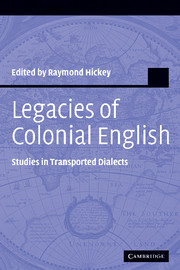Book contents
- Frontmatter
- Contents
- List of figures, maps and tables
- Contributors
- Foreword
- Introduction
- Part I Out of Britain
- Part II The New World
- 4 The emergence of American English: evidence from seventeenth-century records in New England
- 5 The language of transported Londoners: third-person-singular present-tense markers in depositions from Virginia and the Bermudas, 1607–1624
- 6 Remnant dialects in the coastal United States
- 7 Back to the present: verbal -s in the (African American) English diaspora
- 8 ‘Canadian Dainty’: the rise and decline of Briticisms in Canada
- 9 The legacy of British and Irish English in Newfoundland
- 10 The English dialect heritage of the southern United States
- 11 Solving Kurath's puzzle: establishing the antecedents of the American Midland dialect region
- 12 English dialect input to the Caribbean
- Part III The southern hemisphere
- Part IV English in Asia
- Appendix 1 Checklist of nonstandard features
- Appendix 2 Timeline for varieties of English
- Appendix 3 Maps of anglophone locations
- Glossary of terms
- General references
- Index of names
- Index of languages and varieties
- General index
12 - English dialect input to the Caribbean
Published online by Cambridge University Press: 22 September 2009
- Frontmatter
- Contents
- List of figures, maps and tables
- Contributors
- Foreword
- Introduction
- Part I Out of Britain
- Part II The New World
- 4 The emergence of American English: evidence from seventeenth-century records in New England
- 5 The language of transported Londoners: third-person-singular present-tense markers in depositions from Virginia and the Bermudas, 1607–1624
- 6 Remnant dialects in the coastal United States
- 7 Back to the present: verbal -s in the (African American) English diaspora
- 8 ‘Canadian Dainty’: the rise and decline of Briticisms in Canada
- 9 The legacy of British and Irish English in Newfoundland
- 10 The English dialect heritage of the southern United States
- 11 Solving Kurath's puzzle: establishing the antecedents of the American Midland dialect region
- 12 English dialect input to the Caribbean
- Part III The southern hemisphere
- Part IV English in Asia
- Appendix 1 Checklist of nonstandard features
- Appendix 2 Timeline for varieties of English
- Appendix 3 Maps of anglophone locations
- Glossary of terms
- General references
- Index of names
- Index of languages and varieties
- General index
Summary
Introduction
There is no doubt that in the settlement of the Caribbean area by English speakers and in the rise of varieties of English there, the question of regional British input is of central importance (Rickford 1986; Harris 1986). But equally the two other sources of specific features in anglophone varieties there, early creolisation and independent developments, have been given continued attention by scholars. Opinions are still divided on the relative weight to be accorded to these sources. The purpose of the present chapter is not to offer a description of forms of English in the Caribbean – as this would lie outside the competence of the present author, see Holm (1994) for a résumé – but rather to present the arguments for regional British English input as the historical source of salient features of Caribbean forms of English and consider these arguments in the light of recent research into both English in this region and historical varieties in the British Isles. This is done while explicitly acknowledging the role of West African input to forms of English in this region. This case has been argued eloquently and well, since at least Alleyne (1980) whose views are shared by many creolists, e.g. John Rickford. But the aim of the present volume, and specifically of the present chapter, is to consider overseas varieties of English in the light of possible continuity of input forms of English from the British Isles.
- Type
- Chapter
- Information
- Legacies of Colonial EnglishStudies in Transported Dialects, pp. 326 - 360Publisher: Cambridge University PressPrint publication year: 2005
- 5
- Cited by



